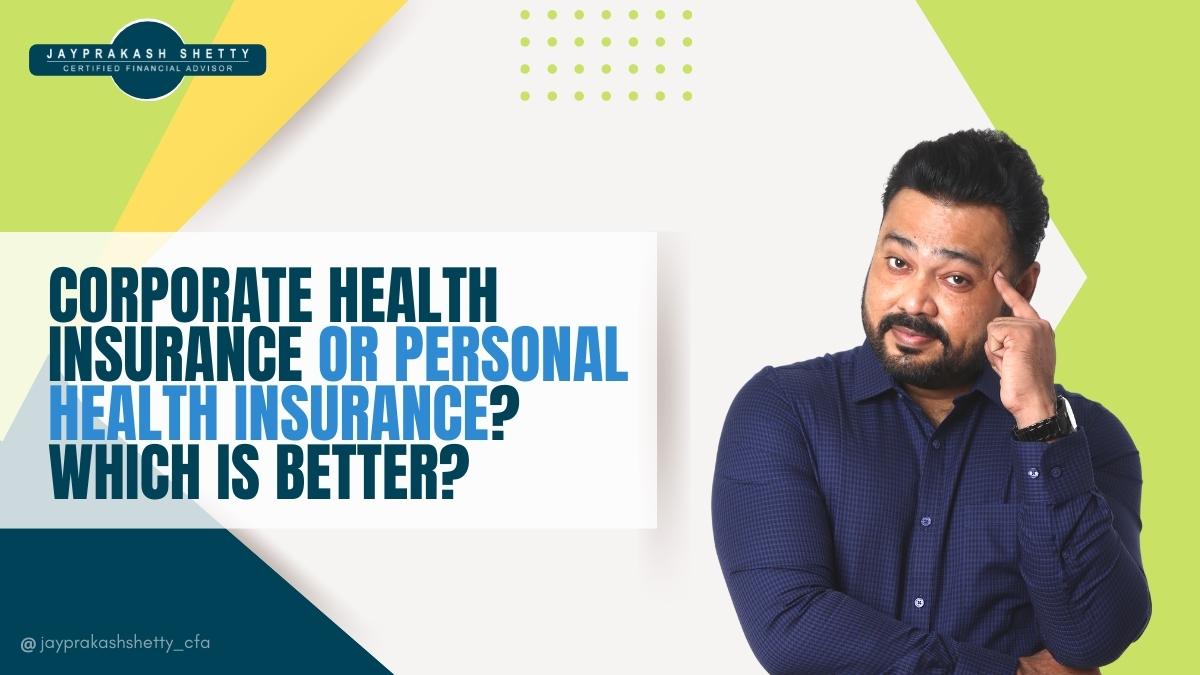Corporate Health Insurance or Personal Health Insurance? Which is better?
Most people do not invest in health insurance because they heavily rely on the cover provided by their employer. Can one afford to forgo health insurance, especially with the cost of healthcare rising at such a rapid rate? We will make an effort to address it from every perspective in order to come up with a solution. It will assist you in deciding which medical insurance plan is appropriate for you and your family.
What is Corporate Health Insurance?
Corporate health insurance is referred to as employer-sponsored insurance that is offered to a company’s employees. Corporate health insurance plans are often created to only cover companies and hired personnel. Employees can, however, choose to extend their coverage to their families by shelling out an extra premium payment. In the event of an accident or illness, you take benefit from such insurance for both treatment and hospitalisation.
What is Individual Health Insurance?
Individual health insurance plans are made to protect a single person against a wide range of ailments, as opposed to corporate health insurance policies that are made to serve a large number of individuals with limited features. You are eligible to use cashless hospitalisation as well as a variety of add-ons as an insured person under this plan, allowing you to increase the level of coverage that is offered to you. The whole sum assured under a personal health insurance plan is intended to cover just one person. Such a plan cannot be amended to include a dependent.
Corporate Health Insurance vs Individual Health Insurance
Let’s compare.
| Area of Consideration | Individual Health Insurance Plan | Corporate Health Insurance Plan |
| Premium Cost | Individual health insurance premium costs could be somewhat pricey. | Corporate health insurance has a low premium cost. |
| Coverage | The policy provides substantial coverage, which makes it a good investment. | On the contrary, the coverage offered by corporates is limited. |
| Customisation | Your medical requirements will be taken care of by individual health insurance. Customisation is possible. | You must accept the coverage that your employer offers. Customisation is not possible. |
| Who is insured? | Only the policyholder alone is insured. To cover family members, one needs to take a family floater plan. | The main individual is insured along with his dependent family members. |
| No Claim Bonus (NCB) | The NCB benefits are available to you through your individual health insurance plan. | Some corporate health insurance policies may not provide the policyholder with NCB benefits. |
| Policy tenure | Personal health insurance policies do not terminate when you leave a job, in contrast to corporate health insurance. | After you quit a firm, health insurance plans are no longer applicable. |
| Who is the purchaser? | Purchase of an individual health insurance plan by the insured/ policyholder. | The majority of the time, a company purchases group health insurance |
| Control over the plan | Total control (The policyholder can control the coverage and add-ons of the plan). | small control (The employer or the purchaser has control over the coverage and add-ons of the plan). |
| Option to buy Add-ons | Any add-on that is offered can be purchased by the policyholder. | None or limited |
| Claims | Direct claims can be filed with the insurance provider. | Typically, claims are submitted by a third-party administrator. |
| Eligibility Criteria | The age of the insurance purchaser and insured should be 18 years or more | He/she should be a permanent employee of the organisation they work for |
| Exit criteria | The policyholder turns 65 years old (the exit age depends upon the terms of the insurance company). | When an employee retires or leaves the company, the insurance plan is no longer in effect. |
| Tax benefit | Yes | No |
| Coverage for Pre-existing diseases | After the waiting period has been completed. | Mostly from the first day itself |
| Maternity Benefits | Need to be purchased under add-ons. | Covered |
| Medical Check-ups before purchase | The insurance company will conduct a mandatory check-up. | In the case of corporate insurance, a medical check-up is not required. |
| Coverage for Critical Illness | If chosen by the policyholder. | Critical illnesses are largely left uncovered. |
| Added benefits | Individual insurance cover is comprehensive, however, the added benefits are limited and typically come with a price tag. | Despite having lower premiums, some exclusive features and advantages are included with your policy for no extra cost. |
Here’s a real-life incident some of us will relate to
Mr. Alok, one of my clients, was relieved to learn that the organisation he works for offers him a health insurance cover of Rs. 5 lakh. His dependant parents were also covered by the policy. He has been employed by the same company for three years, and during that time, he has never needed to use his group health insurance.
However, his father started experiencing kidney issues in the fourth year. His medical testing revealed that he need dialysis and a kidney transplant as his left kidney has stopped functioning. To Mr. Alok’s dismay, the overall cost almost doubled the coverage limit of his corporate insurance policy.
As a result, he had to pay a sizable sum out of pocket. He could have avoided this had he invested in a separate health insurance policy and applied “Coordination of Benefits” to his current employer’s health insurance policy.
What Is Coordination of Benefits?
The amount of coverage you receive may ascend if you have two health plans. The “coordination of benefits” concept is the procedure the insurance companies use to determine which plan will pay first and what the second plan will pay after the first plan has paid when a person is covered by two health policies.
When a claim is made, the primary health plan covers the costs initially. If the first plan didn’t cover all of the costs, the second one takes over. For instance, the second plan can cover a deductible or co-pay from your first plan.
Bottom line
Having both plans—the corporate plan and the personal plan—is a really wise approach that many Indians use. In addition to receiving a great deal of value, doing this gives you a buffer in case your medical emergency exceeds the corporate plan’s limits. That makes sure that no matter what, you and your family are covered from medical emergencies.
It will be wise to consider your corporate insurance policy as a backup choice and purchase a separate health insurance plan that gives substantial coverage customized to your medical needs if you actually want to plan for the future. So once again, it is recommended to purchase personal health insurance even when you are covered by your company’s insurance plan.



0 Comments